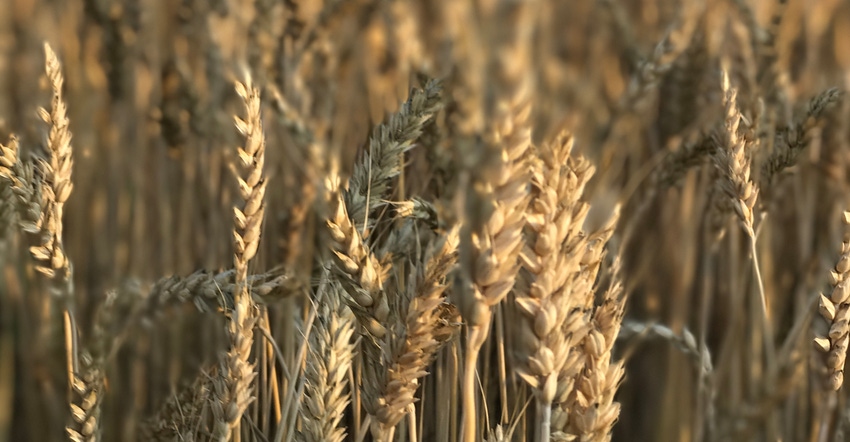August 9, 2021

Farmers making decisions on what varieties of winter wheat to plant this fall may want to check out the newly released Michigan State University Wheat Performance Trials, which were conducted on seven farms and harvested in mid-July.
Results are available now on the Michigan Wheat Program website at miwheat.org.
For more than 30 years, Michigan State University has been conducting Wheat Performance Trials. And for nine years, the Michigan Wheat Program — a checkoff program voted on by growers — has partnered by providing funding and resources to support plot trials to test performance of new varieties in high-management production practices.
There were 114 different varieties tested, and they can be reviewed side-by-side under conventional and high-management production, says Dennis Pennington, MSU wheat specialist and trial researcher.
“The Michigan Wheat Program has supported the high-management research plots for nearly a decade now, and our board feels confident that the data we’ve compiled support the high-management approach to production, which, in turn, grows the bottom line for our wheat farmers,” says Jeff Krohn, chairman of the nine-member Michigan Wheat Program board and a wheat farmer in Owendale.
“While every crop input doesn’t make sense for wheat, we believe the data allows growers to compare high-management with traditional production practices to consider how varieties would perform on their farm, under their management program,” Krohn adds. “The key is to find the varieties that work best for you.”
MSU wheat breeder Eric Olson says, “As I have run the numbers, it shows that some wheat varieties do not return the funds invested in a high-management situation. Some varieties particularly respond to high-management production practices, and others do not. That’s the value in 30 years of plot trials and now nine years of high-management research.”
Results of the 2020-21 research plots in a side-by-side comparison in Tuscola and Isabella counties found that across all 114 varieties, high-management techniques had a mean average of 7.4 bushels more per acre this year. A handful of varieties performed better with an additional 14 to 20 bushels per acre.
“The goal of this project is to provide a data tool for growers to consider improving production and quality in their location,” Pennington says.
Wheat trial details
The performance trials included 63 commercial wheat varieties and 51 experimental wheat seed lines. The seed lines were developed by 15 organizations, including private-sector seed companies, the Michigan Crop Improvement Association and Michigan State University.
“When selecting varieties, it’s important to look at multiyear data from locations that are closest to the soil type and conditions on your farm,” Olson says. “Farmers should study individual varieties across all the parameters evaluated in the trials, including yield, test weight and disease ratings. This report is an unbiased, scientifically-based evaluation of new varieties in various Michigan regions.”
MSU’s wheat research team has planted wheat trial plots for more than 30 years. During the 2020-21 growing season, research plots were planted on privately owned farms, as well as the MSU Research Farm.
Michigan farms hosting the 2020-21 trials included:
Hauck Seed Farm of Rosebush (Isabella County)
Darwin Sneller of Owendale (Huron County)
MSU Mason Research Farm and MSU Fusarium Head Blight Nursery of Lansing (both Ingham County)
Woods Seed Farm of Britton (Lenawee County)
Todd Ableidinger of Hillman (Montmorency County)
JGDM Farms of Sandusky (Sanilac County)
Stuart Bierlein/Micah Laux of Reese (Tuscola County)
High-management wheat plots included an additional 30 pounds of nitrogen per acre (28% nitrogen), as well as Quilt Xcel fungicide tank-mixed with herbicide and applied at Feekes 6.0, and Prosaro fungicide at the average flowering date in each location.
“At its August meeting, the Michigan Wheat Program board will take a deeper dive into results of the 2021 Wheat Performance Trials, including high-management treatments, and will again consider whether to fund this project for a 10th straight year,” says Jody Pollok-Newsom, executive director of the Michigan Wheat Program.
“From the very beginning, the board has been focused on this project and helping growers determine what is the best variety for their farm, their soil and their management style. We know it’s not a one-variety-fits-all approach for growers, and that they need diversity to get the right mix for their farms.”
Results of the 2021 trials, as well as the prior eight years of high-management data, are available at miwheat.org under the Research and High-Management tabs. The 2021 report is also linked under the “What’s Hot” column on the homepage. Questions about the report should be directed to Dennis Pennington, MSU wheat specialist, at [email protected].
The Michigan Wheat Program is funded by about 8,000 farmers who grow wheat in at least 50 of Michigan’s 83 counties. The MWP board seeks to promote the state’s wheat industry by funding and supporting the strategic priorities of wheat farmers working with input suppliers, seed producers, millers, end users and consumers. Research on wheat production practices and grower education has been an early priority for the organization.
Source: MWP, which is solely responsible for the information provided and is wholly owned by the source. Informa Business Media and all its subsidiaries are not responsible for any of the content contained in this information asset.
You May Also Like




